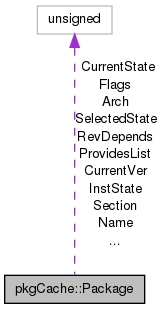contains information for a single unique package More...
#include <pkgcache.h>

Public Attributes | |
| map_ptrloc | Arch |
| Architecture of the package. More... | |
| unsigned char | CurrentState |
| indicates if the package is installed More... | |
| map_ptrloc | CurrentVer |
| index to the installed version More... | |
| unsigned long | Flags |
| some useful indicators of the package's state More... | |
| map_ptrloc | Group |
| index of the group this package belongs to More... | |
| unsigned int | ID |
| unique sequel ID More... | |
| unsigned char | InstState |
| installation state of the package More... | |
| map_ptrloc | Name |
| Name of the package. More... | |
| map_ptrloc | NextPackage |
| Link to the next package in the same bucket. More... | |
| map_ptrloc | ProvidesList |
| List of all "packages" this package provide. More... | |
| map_ptrloc | RevDepends |
| List of all dependencies on this package. More... | |
| map_ptrloc | Section |
| indicates the deduced section More... | |
| unsigned char | SelectedState |
| state that the user wishes the package to be in More... | |
| map_ptrloc | VersionList |
| Base of a singly linked list of versions. More... | |
contains information for a single unique package
There can be any number of versions of a given package. Package exists in a singly linked list of package records starting at the hash index of the name in the pkgCache::Header::PkgHashTable
A package can be created for every architecture so package names are not unique, but it is garanteed that packages with the same name are sequencel ordered in the list. Packages with the same name can be accessed with the Group.
| map_ptrloc pkgCache::Package::Arch |
Architecture of the package.
Referenced by pkgCache::PkgIterator::Arch().
| unsigned char pkgCache::Package::CurrentState |
indicates if the package is installed
Referenced by pkgCache::PkgIterator::Purge().
| map_ptrloc pkgCache::Package::CurrentVer |
index to the installed version
Referenced by pkgCache::PkgIterator::Purge().
| unsigned long pkgCache::Package::Flags |
some useful indicators of the package's state
| map_ptrloc pkgCache::Package::Group |
index of the group this package belongs to
Referenced by pkgCache::PkgIterator::Group().
| unsigned int pkgCache::Package::ID |
unique sequel ID
ID is a unique value from 0 to Header->PackageCount assigned by the generator. This allows clients to create an array of size PackageCount and use it to store state information for the package map. For instance the status file emitter uses this to track which packages have been emitted already.
| unsigned char pkgCache::Package::InstState |
installation state of the package
This should be "ok" but in case the installation failed it will be different.
| map_ptrloc pkgCache::Package::Name |
Name of the package.
Referenced by pkgCache::PkgIterator::Name(), and pkgCache::PrvIterator::Name().
| map_ptrloc pkgCache::Package::NextPackage |
Link to the next package in the same bucket.
| map_ptrloc pkgCache::Package::ProvidesList |
List of all "packages" this package provide.
| map_ptrloc pkgCache::Package::RevDepends |
List of all dependencies on this package.
| map_ptrloc pkgCache::Package::Section |
indicates the deduced section
Should be the index to the string "Unknown" or to the section of the last parsed item.
Referenced by pkgCache::PkgIterator::Section().
| unsigned char pkgCache::Package::SelectedState |
state that the user wishes the package to be in
| map_ptrloc pkgCache::Package::VersionList |
Base of a singly linked list of versions.
Each structure represents a unique version of the package. The version structures contain links into PackageFile and the original text file as well as detailed information about the size and dependencies of the specific package. In this way multiple versions of a package can be cleanly handled by the system. Furthermore, this linked list is guaranteed to be sorted from Highest version to lowest version with no duplicate entries.